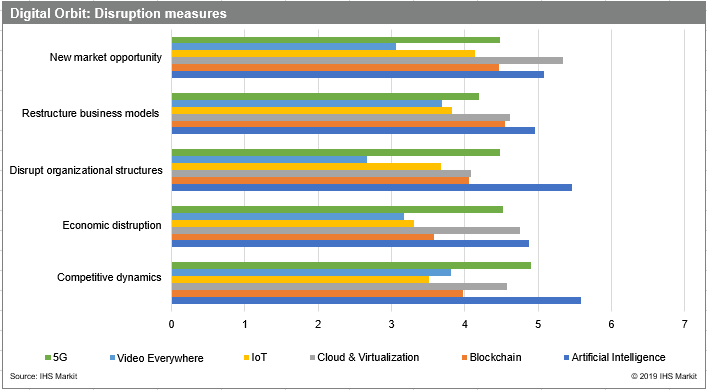The term “transformative technologies” refers to technological
forces of change so significant and powerful as to completely upend
existing structures and mechanisms, in the process altering
business, industry, and the current accepted means of production in
fundamental ways. Disruptive by their very nature, transformative
technologies change the status quo, with disruption often taking
effect very rapidly.
The considerable degree of disruption caused by transformative
technologies is indicated in the relatively high scores seen in
Digital Orbit in the key metric of impact, which measures how a
specific technology will change industry.
Among the business leaders and industry movers who serve as
respondents to Digital Orbit’s Key Influencer Survey, 56% believe
that transformative technologies will have a high-to-significant
disruptive impact on their industry within the next three years.
Only 4% believe there will be little or no disruption. The survey
is an appraisal of the six transformative technologies tracked by
Digital Orbit—Artificial Intelligence, 5G, the Internet of
Things (IoT), Cloud & Virtualization, Blockchain, and Video
Everywhere—and their prospects for adoption from the
perspective of important industry influencers and leaders.
But in which industries will disruption occur? And in what ways
and form will the disruption manifest?
Variables affected by disruption
In Digital Orbit, IHS Markit examines specific variables
vulnerable to the disruption brought about by the transformative
technologies covered by the study.
The two most important variables are competitive dynamics and
the opening of new market opportunities. The first variable
investigates whether the adoption of transformative technologies
will create a path for new market entrants or pave the way for
smaller players to become market leaders. The second variable,
meanwhile, asks whether implementation of transformative
technologies will create new markets where none previously
existed.
Three other variables are also relevant.
Disruption to the ecosystem is the variable that
evaluates whether implementation of transformative technologies
will shake up existing ecosystems or value chains in industry.
Disruption to organizational structure is the variable
concerned with whether organizations within the affected industries
will change their organizational structure and workforce when
transformative technologies are implemented.
Restructuring of business models, the fifth and final
variable, inquires whether the development of a transformative
technology can cause radical change to existing businesses.
For business leaders and key decision-makers in industries or
organizations, knowledge of impending disruption and the ability to
prepare for it is of critical importance. Unfamiliarity or failure
is likely to result in loss of market for a company or consign it
to irrelevance.
Consumer industry and disruption
A review of the scores for the five variables in Digital Orbit
shows that the consumer industry is expected to experience the
greatest amount of disruption from transformative technologies.
This is not surprising, given that the consumer industry has
adopted most of the transformative technologies monitored by
Digital Orbit.
How disruption will take place in the consumer and other
industries will vary by technology, as shown in the chart below.
Overall, the Digital Orbit scores indicate that new market
opportunity and competitive dynamics will be the principal areas of
disruption. Meanwhile, respondents in the Key Influencer Survey
identified disruption to organizational structures as the most
frequently cited factor of disruption in their organizations.

The chart also shows that “New Market Opportunity” and
“Restructure business models” have somewhat similar results. This
is a logical outcome: As transformative technologies open new
markets in industries, enterprises will need to develop new
business models to address the fresh opportunities that arise from
the transformations taking place.
Josh Builta is senior principal analyst for
transformative technologies at IHS Markit
Posted 26 June 2019